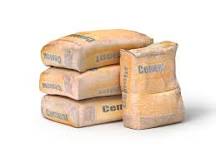Description
Cement serves as a fundamental binder in construction, setting and hardening as it dries, while also reacting with carbon dioxide in the air to achieve its durable properties. Its primary function is to bind other materials together, making it indispensable in construction and engineering applications.
Among the various types of cement, Portland cement is the most widely used. It is produced by burning a homogenized mixture of clay and limestone, resulting in an intermediate product known as clinker. This clinker is then finely ground with gypsum in specific proportions to create the final product, Portland cement. This versatile material is a cornerstone of construction, used extensively in buildings, bridges, roads, and housing projects.
In Nigeria, cement is vital for infrastructural development. It is used in mortar and concrete production, where it is mixed with sand, crushed stones, or aggregates to create materials suited for diverse construction needs. Cement is not just a material but a key indicator of economic activity, often regarded as a barometer of progress in developing nations.
Historical Background and Evolution of Cement Production in Nigeria
The history of cement production in Nigeria began in the early 20th century, with the establishment of the first cement factory, Nigerian Cement Company (NIGERCEM), in 1954 at Nkalagu, Eastern Nigeria. This marked the genesis of local cement manufacturing, paving the way for the development of other plants across the country.
By the 1960s and 1970s, the Nigerian government recognized the strategic importance of achieving self-sufficiency in cement production to support the nation’s burgeoning construction industry. This led to the establishment of several state-owned plants. However, these efforts were hampered by challenges such as obsolete technology, inconsistent power supply, and inadequate maintenance, limiting their productivity.
In recent years, Nigeria has emerged as one of Africa’s leading cement producers. Several key players have transformed the industry, including Dangote Cement, Lafarge Africa, and BUA Cement. These companies have modernized their facilities and expanded production capacities to meet growing demand.
Key Players in Nigeria’s Cement Industry
Dangote Cement: As Africa’s largest cement producer, Dangote Cement boasts a production capacity of 52 million tons per annum, with Nigeria accounting for 35 million tons. The company’s state-of-the-art facilities and efficient operations have revolutionized cement production in the country.
Lafarge Africa: A subsidiary of LafargeHolcim, this company is known for its high-quality cement products and commitment to sustainability. Lafarge operates multiple plants in Nigeria and focuses on reducing its environmental footprint while promoting sustainable construction.
BUA Cement: Known for rapid growth and expansion, BUA Cement has become a prominent player in the Nigerian market. The company has invested heavily in modern production technology and infrastructure, solidifying its position in the industry.
Global Cement Industry and Market Trends
The global cement market was valued at $385.8 billion in 2023, with projections to reach $629.9 billion by 2032, growing at a compound annual growth rate (CAGR) of 5.4% between 2024 and 2032. This growth is driven by factors such as rapid urbanization, infrastructure development, and increased construction activities, particularly in emerging economies.
In Nigeria, the cement industry is poised for steady growth, with ConsTrack360 projecting a 3.2% annual growth in 2023, amounting to $3.4 billion. The long-term outlook remains positive, with expectations of a CAGR of 3.3% from 2023 to 2027, culminating in an output of $3.89 billion by 2027.
Demand Drivers for Cement in Nigeria
Urbanization and Housing: Rapid urbanization and population growth have spurred the demand for housing and infrastructure, driving cement consumption.
Infrastructure Projects: Government initiatives focused on roads, bridges, airports, and railways significantly boost cement demand.
Private Sector Investments: Real estate and industrial development projects led by the private sector are key contributors to cement usage.
Cement consumption in Nigeria is heavily concentrated in urban centers like Lagos, Ibadan, and Port Harcourt in the southern and southwestern regions, as well as in the north, where infrastructure projects are expanding.
Proposed Cement Production Plant in Edo State
The establishment of a cement production plant in Edo State is both viable and timely, considering the local and regional demand. The major raw materials required for production—limestone, ball clay, iron ore, and gypsum—are locally available, ensuring cost-effective operations.
The proposed plant will have a production capacity of 12,000 tons per day and will operate three shifts of eight hours each for 300 days annually, at 80% of its installed capacity. The project will utilize advanced technology to ensure high-quality output and efficiency.
The cement industry in Nigeria is a crucial driver of the nation’s economic development, supporting infrastructural growth and providing employment opportunities. With a strong demand for cement in housing and infrastructure, and the presence of established local producers, Nigeria is well-positioned to sustain and expand its cement production capabilities.
Investing in modern, efficient production facilities and fostering innovation will further solidify Nigeria’s role as a leading cement producer in Africa.


Reviews
There are no reviews yet.